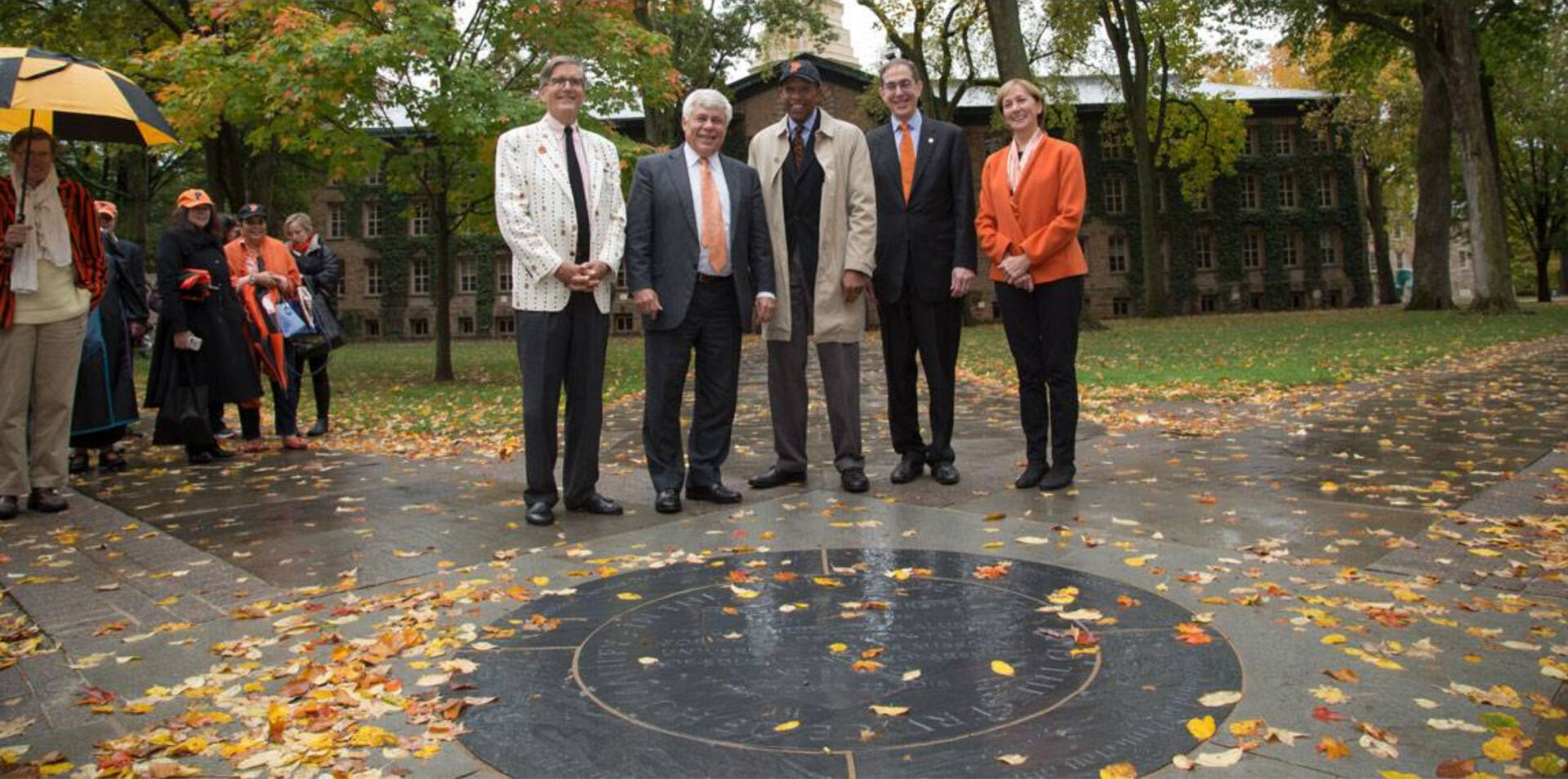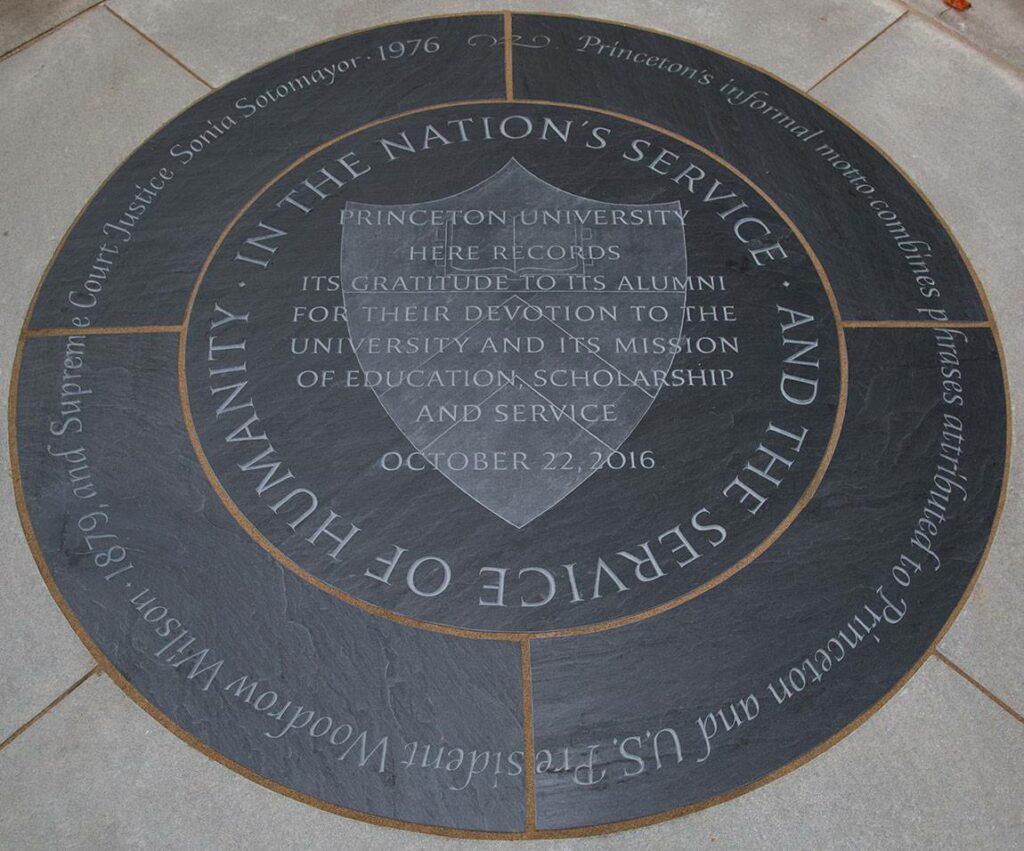Lansing, MI. For all four years I was at Princeton, they never let me forget that the university’s unofficial motto was “In the Nation’s Service and the Service of Humanity.” Actually, two years in, they decided to change it from “Service of all Nations” to “Service of Humanity”—more cosmopolitan; therefore, better.
Four years of that. To be completely honest, I think that it might have been slightly more tolerable if Princetonians actually believed in the motto, but true believers are few and far between. It’s actually a running joke (and a statistical fact) that after many students snag their liberal arts education they “sell out”—i.e., go into finance or management consulting. High paying jobs both, the better to make some serious cash in your twenties and maybe be able to afford that mortgage in Ritzy NYC Suburb #4.
That’s the standard pipeline—get to Princeton, hope and dream of making the world a better place, listen to four years of “in the Nation’s Service” and such, and then sell out hard.
But again, Princeton the institution doesn’t officially promote this sort of hard sellout. Princeton the institution is all about the nation’s service and all humanity. Credit where credit is due: it’s a liberal arts university devoted to trying to give people the tools to actually make a difference. Which raises the question, then—what on earth is wrong with Princeton’s culture?
If I had to venture a guess, I’d say the same phenomenon that drives Princeton students to fatalism is in fact the chief cause of our world’s ills. Or, to be at least a little more theologically rigorous—the chief cause of the severity of our world’s ills.
Long story short, when you put a bunch of people who have been big fishes in their respective ponds into a pond solely populated with big and bigger fish, they begin to doubt themselves. Freshman orientation tells Princetonians to watch out for impostor syndrome. “Everyone is talented in their own way,” they say. Most students take it to heart—they are talented in their own way—but being surrounded by smart people invites students to question their own ability to “make a difference” for humanity. So most students end up assuming that when push comes to shove, the bigger fish will change the world, not them. And if you can’t change the world? Might as well stop trying, and boom—welcome to Goldman Sachs.
There is indeed always a bigger fish. Or, even for the biggest fish, there’s no guarantee that they’ll always be the biggest fish. Eventually another fish will come along, take whatever Fish #1 did and filet it too. This, ultimately, is how history works. Someone has an idea, and they manage to get their hands on enough power to actually put it in play. They do, and stuff is pretty good. According to some people. According to other people, who the first group now dub unsavory malcontents, it isn’t actually all that great. Something new! Something better! The malcontents eventually snatch power and the cycle repeats—on and on and on.
In other words, it is frankly impossible to be in the service of all humanity, because each individual member of humanity seems to have a distinctly different idea of what it actually looks like to be in the “Service of Humanity.” Everyone wants the world to be saved—they really do want The Good—but they all pretty clearly disagree about what said Good actually is.
The upshot is that saving the world seems a fool’s errand because, first, someone else is smarter than you and better equipped to do so and, second, your vision of what “saving the world” would entail is hotly contested. Princeton students, eager to not be fools, promptly disappear into the Mirkwood of high finance, leaving Princeton the institution wondering why so few of its alumni seem to be in anyone’s service, period.
Mick LaSalle, writing in San Francisco Chronicle’s entertainment magazine Datebook attributes the rise of interest in superhero movies to a “crisis of individuality.” In other words, people have stopped truly believing in the importance and power of the individual in the world. Superheroes, naturally, are the antithesis of this—they’re individuals with such substantial powers that they become “undeniably significant” to everyone else. Suddenly, in comparison to all the other ants in the hill, they’re an anteater.
The author qualifies that the superhero movie exists as a sort of dangerous wish fulfillment. Highly unstable individuals should not have the fate of the world in their hands, no matter how appealing it might be. Nonetheless, his observation that there exists a growing sentiment that one’s actions don’t matter in the slightest? That nothing can be done to stop an inexorable march toward eternal rule by The Not So Good? Right on the money.
This is precisely why people turn to superhero films. Not just for the fantasy of living a life as Iron Man or Captain America, but also for the consolidation of The Bad into one existential, unifying, commonly-agreed-upon threat. Aliens. Mass genocide. Aliens committing mass genocide. Etc.. A commonly agreed-upon-threat is something that can be taken care of by a sufficiently superpowered individual. The world can in fact be saved. Unfortunately, we have very few commonly agreed upon threats. Also, the brilliant technocrats who are our culture’s version of superheroes seem to create as many threats as they eliminate.
Superheroism, no matter how appealing or well-intentioned it is, typically results in a whole lot of collateral damage.
Perhaps the real superpower, however, isn’t the ability of one very smart individual to effect “undeniably significant” change but the ability we all have to contribute to the good of our particular places and communities. Central to this ability is a trait that Princeton and other elite institutions don’t do a great job of cultivating—empathy. We often forget about it, especially in an age defined so much by atomization and technology as this one, but unlike our latent capacity to sense magnetic fields (really—check it out) we haven’t entirely forgotten how to use it.
Empathy is useful for two reasons: First, it allows people to understand other people. The exercise of empathy makes it so that one person can actually comprehend how someone else’s lived experience results in the worldview they possess and the goods that they desire. Prior to empathizing, the other person was a disagreeable malcontent or a problem to be solved by a smarter plan. But empathy entails the inevitable “I see why you might think that” and a desire to converse, rather than merely solve. Second, it allows people to develop relationships despite their differences (whether stark or slight) in worldview and, eventually, value the other person’s happiness in addition to their own.
None of this is particularly avant-garde. But an empathetic approach to the kind of lofty goals named by Princeton’s aspiration to serve “humanity” might empower talented young people to serve their communities rather than selling out for personal financial success. You have to be very smart and very powerful to save the world, but serving your community begins with empathy, which is a trait we can all cultivate.
Empathy is no silver bullet, however. Let’s talk about some of empathy’s inherent limitations. First, empathy is an emotional disposition, not something that can be rationally summoned into being. Feelings take time. Even if you want to develop empathy for your fellow man, it’s going to take time to get to know the other person and start truly feeling with them rather than conceptually feeling for them. Second, since empathy takes time to develop and since it’s more than just a rational orientation toward people writ large, it follows that there are only so many people that any one person can in fact empathize with. In other words, no matter how much you want to empathize with some person you’ve never met on the other side of the planet, the nature of human empathy makes it impossible to universalize.
Practically, this disallows for cosmopolitanism. No “Service of Humanity”—there is no singular thing that an individual person can do that all of humanity would judge to be a service. There is no worldview universally perceived as good. While people are capable of subordinating their preferences to those of a group, the inherent limitations of empathy make it impossible to do this with large groups. While it’s no doubt possible to “be kind” in a cosmopolitan manner, creating a society that forms individuals to empathize with one another can only happen on a human scale.
What would such a society look like? It would require both a method by which people could develop empathy for each other and a method by which people who empathize with each other could actually shape the society around them. In many respects, this is what all democracies aspire to. Democracy doesn’t work like this in practice except in exceptionally small countries like Tuvalu and on company boards, but if it actually worked, this is what it would do—allow people to shape their societies as they see fit.
“So your solution to the world’s problems is democracy?” I hear you ask. Not quite—after all the democratic system actually has to live up to its potential. What is needed in society is not just democracy, but a culture of empathetic deliberative democracy.
Let’s break that down.
First, culture. If people only treat each other with love, respect and dignity during council meetings, then that “empathy” is just lip service. People have to be willing to take the same spirit of compromise and loving their neighbor outside of the explicit activities of governance. And society must be arranged in order to foster that sort of empathy. Participants in the democratic process must regularly interact in a meaningful way in a multitude of different circumstances. They must, to put it succinctly, be capable of developing real friendships where the other person’s well-being becomes at least something worth taking seriously. Furthermore, they ought not be told that the strong relationships they have in college are solely a collegiate phenomenon. The extraordinary depth of college relationships shouldn’t be seen as a means to a degree and a good-paying job; it should be seen as the thing having a degree and a job might allow someone to pursue over the course of a full life. And if the job requires a two-hour, sixty-mile commute, it too is anathema to this pursuit. People must—must—live at a human scale or the society that they live in will never be able to attain any degree of excellence by virtue of it being inescapably atomized.
Second, “deliberative.” Democracy cannot solely be a matter of votes. It must be an active process and recognized for all its complexity. Finding solutions that appeal not just to a tyrannical majority but that take into account everyone in society will require careful calibration and compromise. Giving people the actual ability speak up and then actually listening is so important its value cannot be overstated. And deliberation, again, must extend beyond the four walls of City Hall. It happens in the workplace, the backyard, the drop-off line at the elementary school. And it should start in college: rather than just conceptually teaching students about the value of getting hands-on experience being an active part of their community, colleges should actually empower them to shape the community they’re in. In the same way that people look back on their college relationships with nostalgia they should also look back on opportunities they had in college to improve their and their friends’ livelihoods. Merely suggesting that it’s each citizen’s duty not only to participate, but to try and develop empathy for those around them isn’t enough. Give people the opportunity to do so.
If such a culture is implemented, it begins to be clear how the world could in fact get better. Alexis de Tocqueville summed up such a system’s potential in Democracy in America: “The New Englander [of the 1830s] is attached to his town not so much because he is born there as because he sees the town as a free and powerful corporation of which he is a part and which it is worth his trouble to seek to direct.”
Each person, heard and empowered within their direct society, begins to realize again their import as an individual. Existing within an environment that encourages empathy then in turn tempers that individual’s desire to impose their unadulterated version of The Good without any regard for anyone else’s understanding of the same. The autonomy afforded to them by being in a small enough milieu that they are truly free, in the Aristotelian sense, is imparted with its necessary dose of rationality not by force but by proximity to other individuals whose inherent dignity both must be reckoned with and is actually recognizable.
Perhaps it shouldn’t be shocking that the key to saving the world by saving all of the little worlds within it entails loving one’s neighbor as oneself and giving the tools to others to do the same. Yet in our competitive and technocratic milieu, such a claim can seem shocking. Society is in such a state of disarray that the proposal of arranging it such that the people making the decisions that govern it actually start from a place of empathizing with each other sounds outlandish. It is no wonder that the human capacity to empathize legitimately seems like a superpower, something granted only to Peter Parker and maybe a couple of others.
My dad often emphasizes that the reason communism didn’t work and cannot work is because it requires humans to be moral. In other words, it ignores human nature and expects that people will be able to act “in the Service of the Nation and the Service of Humanity.” Inevitably, given the limits of empathy, they cannot, and instead start acting for themselves.
Winston Churchill is oft misquoted as saying that “capitalism is the worst economic system, except for all the others.” (What he actually said was, “Democracy is the worst form of government, except for all those others that have been tried.”) Regardless, what we’re now realizing societally is that capitalism, while it handles people behaving badly with more aplomb than communism does also, in the end, requires people to be moral.
All this raises a question: shouldn’t we be designing systems—educational institutions, livable communities, workplaces, and others—that encourage people to behave morally rather than simply slapping vague mission statements onto systems that couldn’t care less?






5 comments
Russell Arben Fox
Christian, this is a marvelous essay; thank you for sharing it. I’m going to steal “culture of empathetic deliberative democracy” for my classes henceforth; it expresses what need very concisely and very well.
Christian S
Russell, greatly appreciated! Glad my little phrase will get a bit of press. Hopefully it’ll become an earworm and begin to spread.
David Naas
“…forgive us our trespasses as we forgive those who trespass against us…”
You can’t really forgive others if you don’t understand – or empathize – with them.
And you can’t forgive others unless you also forgive yourself. And you can’t forgive yourself unless you understand yourself. And… But it is not infinitely recursive.
The hardest thing is to discover that other people are different from one’s self, and that’s OK. The hardest thing is to forgive those who sin differently than yourself. The hardest thing is to realize in your bones that dirty so-and-so who offended you is loved by God as much as you are, and that you need repentance as much as he does.
Is life a comedy or a tragedy? Depends on how it ends.
Zack
This was a fantastic read. Thank you for taking the time to write it. In a society marked by morally stunted individualism, we would do well to regain a sense of common virtue based around our sphere of influence. Twitter be damned…
Christian S
Zack, thanks! Glad you enjoyed it, and completely agree. Hoping my stint on Twitter ends in relatively short order, but we’ll have to see!
Comments are closed.